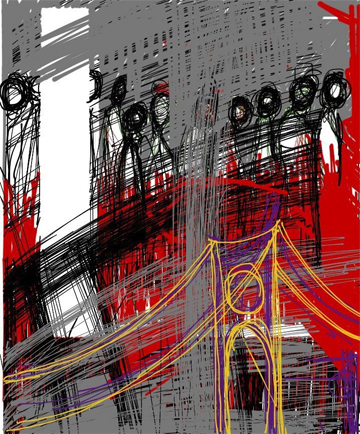Artwork: Deir Ezzor La Revolution Syrienne en Français.
I have become dreadfully weary throughout the past two years of the rhetorical practices of apologists for the crimes of Mideast dictatorships. A particularly unnerving yet predictable example of this is the conspiracy theory that has been promoted since the very beginning of the Syrian Revolution. As if completely oblivious of the risk that resorting to conspiracy theory could be widely interpreted as a sign of weakness, the Syrian state media, assisted by sympathetic media outlets in Lebanon and the "pseudo leftists" intellectuals and journalists in the West, have sought to distract their viewers and readers with a seemingly perpetual conjuration of remembrances about past foreign plots and aggressions against Syria and the Arab world. One often hears or reads of Condoleezza Rice’s vision for a "New Middle East," with its vocabulary of "creative chaos," a “new Sykes-Picot," the impending "Balkanization" of the Middle East. Most if not all of these clichés have been repeated by Lebanese pundits, both on television and in the opinion pages of leading Lebanese and Arab newspapers.
One need not dwell on the unsavory details of this propaganda operation, however, since every mendacious claim regurgitated on Lebanese and Arab media is exposed and discredited by the images of massacres, the cold-blooded knifing of victims, and the uprooting of people from their native villages and towns, scenes out of the Middle Ages. But in the midst of my readings and tortured viewing of television interviews, I read an article by a Lebanese journalist and author, Ali al-Amin." What follows are some of the highlights and insightful thesis of Al-Amin’s article which shed some light on the current crisis in Syria. Al-Amin's ideas were published in the Lebanese newspaper, Al Balad, on August 24, 2012: http://www.albaladonline.com/ar/NewsDetails.aspx?pageid=46539
The system of values into which Syrians and Lebanese have been socialized is "strange." The populace is frequently subject to manipulation by scare tactics, fear mongering, and the exploitation and exacerbation of sectarian tensions. This system is propagated in defiance of the logic of history and human values.
Some of his ideas desperately promote a future scenario in which "peoples suffering from tyranny, oppression, and despotism" will be able to defeat their enemies, and that "societies living in republics of fear, or their sectarian, Islamic and secular kingdoms" will be capable of practicing their freedom of expression and liberate their territories from occupation. Al-Amin’s claim that "despotism produces only defeats, whether they are cultural or military" is supported by long-established historical facts. "Internal defeat" presents an advantageous situation to external enemies, be they "Israel" or any other power, as well as to internal enemies like "underdevelopment" which "left Syria behind the modern world" for decades.
Although tyranny is a system of government opposed by all religions (including Islam), and all humanitarian laws "deny legitimacy to such conduct," ideological or political Islam along with other forces attempt at times to "rationalize oppression and justify it" and bestow upon it "holiness" in political practice, if it serves a particular interest at a given time.
The title al-Amin gave to his article, "Rejectionism (Mumanaa) at the Moment of its Fall: Naked Sectarianism," is significant in this context. It is no wonder that "the rejectionist-liberationist-religious discourse" always inevitably reveals itself to be little more than a litany of sectarian accusations, often expressed in thinly veiled insinuations of a divisionary nature. In this manner, political deceit is used to reinforce the basest and most antagonistic of tendencies of the popular base. This practice is responsible for unleashing the culture of sectarian animosity and stifling the forces that are legitimately resisting the despotism at home.
When it becomes difficult to dispute the demands for freedom, dignity, and the end of tyrannical control and domination of the Syrian people, the ideologies of conspiracy and religious mysticism are invoked. It is the response of those with failed visions to associate reason as frequently as possible with a form of magical-religious thinking, with the goal of neutralizing to the fullest possible extent any intellectual and religious resistance that may arise. In other words, as reason and logic become marginalized, superstition and sectarian fanaticism are increasingly advanced as the answer to rationalizing the "illogic in our worldly life" and to justify crushing the oppressed and those who aspire to achieve basic human dignity. Thus, the culture of religious and non-religious despotism becomes useful in expanding the use of force in confronting and managing dissent, as well as in elevating the killing of civilians to the level of a patriotic or even "heroic" deed by the standards of the Syrian regime.
An example of the extension of despotism in the Syrian regime deep into civil society is its elaborate security apparatus whose ostensible goal is the liberation of the Golan Heights, effectively allowing freedom to sit on a shelf. But the reality of this operation is that the "progressive national regime" has simply replaced the occupier with a corrupting and oppressing society. As is painfully obvious, the occupied land has yet to be liberated despite years of solemn promises to the contrary and the deliberate evisceration of state institutions at the behest of this liberation mythology. When the population rebelled, the regime unleashed the machine of killing and destruction. Can any reasonable person remain silent while watching Syrian MIG 23 and Sukhoi jets distribute the regime’s vengeance upon the citizens, cities, and villages of its most glorious homeland? This method exposes the extent of the alienation that separates the Syrian people from the state and the unprecedented animosity directed by the state toward the people, an animosity manifest in an oppression of unparalleled scope and criminality against initially unarmed citizens with entirely reasonable demands.
This article appeared in Al Jadid Magazine, Vol. 17, No. 64, 2011.
Copyright © 2011 AL JADID MAGAZINE

